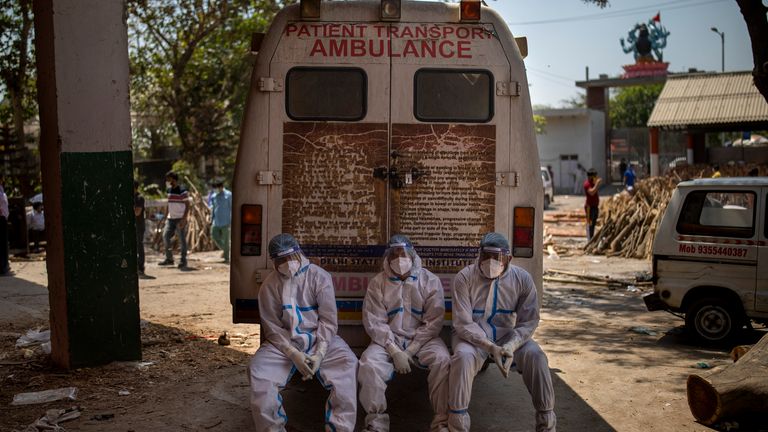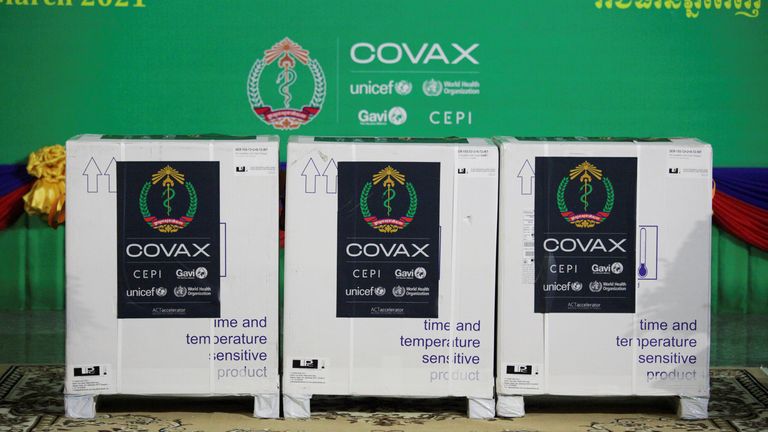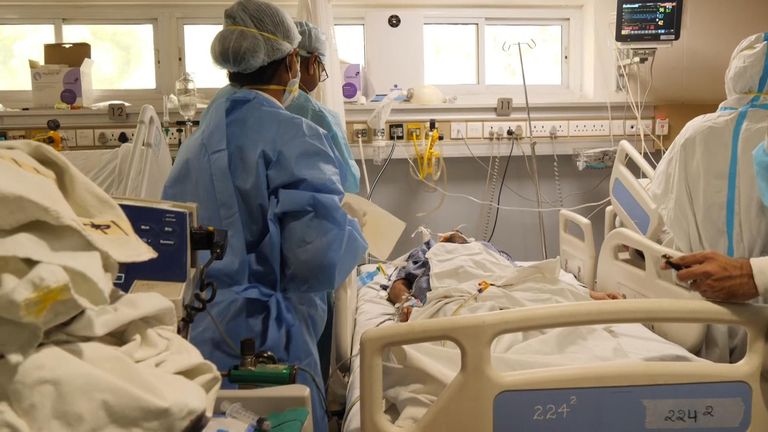The halt in exports is a blow to the Covax vaccination programme, which is heavily reliant on supplies from India.
Tuesday 18 May 2021

Supplies of the AstraZeneca vaccine are being diverted to India's own COVID crisis
The world's biggest maker of the AstraZeneca vaccine is unlikely to resume major exports until at least October as it prioritises doses for India's coronavirus crisis.
The Serum Institute of India (SII) said it hoped to restart exports to the Covax programme and other countries by the end of the year.
Sponsored link
Doses have been saved for India's devastating COVID surge since exports were stopped a month ago.
Some 66 million doses from India have been sold or donated abroad so far - but the country has only vaccinated a tiny proportion of its huge population.

The world's biggest maker of the AstraZeneca vaccine is unlikely to resume major exports until at least October as it prioritises doses for India's coronavirus crisis.
The Serum Institute of India (SII) said it hoped to restart exports to the Covax programme and other countries by the end of the year.
Sponsored link
Doses have been saved for India's devastating COVID surge since exports were stopped a month ago.
Some 66 million doses from India have been sold or donated abroad so far - but the country has only vaccinated a tiny proportion of its huge population.

India's health system has been overwhelmed by its current surge
Indian government sources said sizable exports were now unlikely to restart until at least October - a longer delay than expected.
SII had previously expected shipments to get back on track from June.
"It was internally discussed and some countries were asked not to expect export commitments given the current Indian situation," one anonymous Indian government source told Reuters news agency.
It was not stated which countries could be affected.
India's spike in cases has seen a chronic shortage of beds and oxygen, with many people having to source their own drugs and oxygen for relatives on the black market.
Despite being the world's biggest vaccine producer, it has fully vaccinated only about 2.9% of its 1.35 billion population, according to health ministry data.
The SII said in a statement that it had never exported vaccines at the cost of the Indian people

Indian government sources said sizable exports were now unlikely to restart until at least October - a longer delay than expected.
SII had previously expected shipments to get back on track from June.
"It was internally discussed and some countries were asked not to expect export commitments given the current Indian situation," one anonymous Indian government source told Reuters news agency.
It was not stated which countries could be affected.
India's spike in cases has seen a chronic shortage of beds and oxygen, with many people having to source their own drugs and oxygen for relatives on the black market.
Despite being the world's biggest vaccine producer, it has fully vaccinated only about 2.9% of its 1.35 billion population, according to health ministry data.
The SII said in a statement that it had never exported vaccines at the cost of the Indian people

The halt in exports is a blow to the Covax programme to provide jabs to poorer nations
Other vaccine makers outside the country are being urged by the World Health Organisation to help fill the shortfall.
Its director-general, Tedros Ghebreyesus, has warned of "vaccine apartheid" - with wealthy nations surging ahead and poorer ones left struggling with too few doses.
The WHO's Covax programme aims to provide several billion doses to poorer and less developed countries - with more than a billion of those expected from India.
Gavi, the vaccine alliance, said at least 140 million doses from SII that were lined up for Covax by the end of May would now stay in India.
UNICEF's boss also urged G7 countries this week to increase donations to Covax to make up for the dip in supplies from India.
The organisation estimates a shortfall of some 190 million doses by the end of June.
US President Joe Biden said on Monday he would donate at least 20 million doses of the Pfizer, Moderna and Johnson & Johnson jabs - on top of 60 million AstraZeneca doses already promised.
Other vaccine makers outside the country are being urged by the World Health Organisation to help fill the shortfall.
Its director-general, Tedros Ghebreyesus, has warned of "vaccine apartheid" - with wealthy nations surging ahead and poorer ones left struggling with too few doses.
The WHO's Covax programme aims to provide several billion doses to poorer and less developed countries - with more than a billion of those expected from India.
Gavi, the vaccine alliance, said at least 140 million doses from SII that were lined up for Covax by the end of May would now stay in India.
UNICEF's boss also urged G7 countries this week to increase donations to Covax to make up for the dip in supplies from India.
The organisation estimates a shortfall of some 190 million doses by the end of June.
US President Joe Biden said on Monday he would donate at least 20 million doses of the Pfizer, Moderna and Johnson & Johnson jabs - on top of 60 million AstraZeneca doses already promised.
Meanwhile, India's COVID spike is still far from over.
Deaths increased by a record 4,329 to nearly 279,000, according to figures released on Tuesday. And an average of 340,000 cases were confirmed each day last week.
However, there are signs of improvement in some areas - particularly the metropolis of Mumbai, where cases have fallen nearly 70% over the last week.

No comments:
Post a Comment